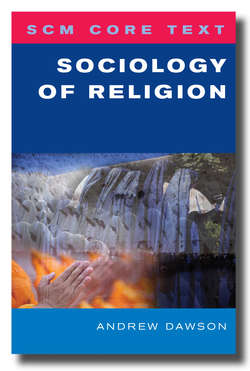Читать книгу SCM Core Text Sociology of Religion - Andrew Dawson - Страница 30
На сайте Литреса книга снята с продажи.
Functional definitions
ОглавлениеAs the term implies, functional definitions of religion strive to express the social role or function which religious belief and practice play within the broader societal context.1 French sociologist of religion Hervieu-Léger offers the following functional definition of religion:
[R]eligion is a mode of imposing a social construction on reality, a system of references to which actors spontaneously have recourse in order to conceive the universe in which they live . . . religion is an ideological, practical and symbolic system through which consciousness, both individual and collective, of belonging to a particular chain of belief is constituted, maintained, developed and controlled. (2000, pp. 16, 82)
Hervieu-Léger hereby defines religion as a form of symbolic understanding through and by which humanity makes sense of both its surroundings and experience thereof. In effect, religion enables individuals and communities to function in the world by way of rendering their existence meaningful. For Hervieu-Léger, religion does this by drawing upon a range of theories, principles and practices which are inherited from and authorized by past generations in the form of tradition (here, ‘chain of belief’).
As with substantive definitions of religion, functional approaches have their limitations. If the strength of functional definitions lies in their ability to communicate the role played by religion relative to its social context, their weakness resides in their inability to identify with any meaningful precision the differences between religion and other non-religious modes of life which fulfil the same functions. If the social role of religion is that of making existence meaningful, for example, in what manner is religion different from the myriad other ways in which people render their world significant? Likewise, if the social role of religion is that of engendering societal cohesion, just what is it about religion which makes it different from other means which fulfil the same function?
By stressing functionality over substance, functional definitions of religion inevitably sacrifice attention to the precise details about religion which enable its differentiation from similar, but non-religious, modes of thinking, feeling, judging and doing. Consequently, functional definitions are unable to furnish sufficient substance to make possible sociological explorations of the precise differences between, for example, regular religious adherence and committed support of a football team. While participation in religious activities might have the same functional consequences as impassioned football support, the simple identification of shared social outcomes is not enough to tease out the precise differences between these two forms of commitment-orientated social behaviour. If substantive definitions of religion can be sociologically myopic, functional definitions are susceptible to analytical vacuity. Lacking the specificity necessary for fruitful critical analysis, functional definitions tell us what religion does without communicating what religion is; and, by extension, what it is not.
